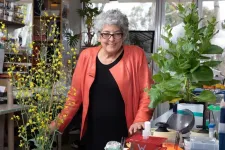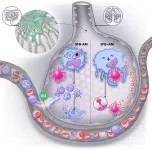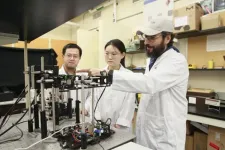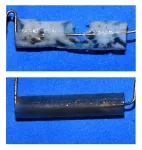(Press-News.org) [New York, January 30, 2024] – Sergio E. Baranzini, PhD, a geneticist, neuroimmunologist and data scientist at the University of California, San Francisco, is the winner of this year’s Barancik Prize for Innovation in MS Research. Dr. Baranzini is being recognized for his pioneering efforts to integrate vast pools of information to understand complex mechanisms that cause MS and to develop more precise approaches to stop the disease and end it by prevention.
Baranzini is a Distinguished Professor and holds the Heidrich Friends and Family endowed chair in Neurology at the University of California, San Francisco (UCSF). He is also a member of the Graduate Program in Bioinformatics, the Institute for Human Genetics, the Bakar Computational Health Sciences Institute, ImmunoX, and the Benioff Center for Microbiome Medicine.
He is part of a new generation of scientists in the field of MS who are integrating massive amounts of data being generated by advanced technologies and gaining deeper understanding of factors that are driving the disease.
Key to these endeavors are global collaborations. Baranzini established the international MS microbiome study (iMSMS), a consortium of investigators in the field of MS and microbiome to discover the role that gut bacteria play in the triggering, progression, and response to treatment for people with MS. They have enrolled more than 2,000 participants, making it the largest microbiome study in MS and in any other autoimmune condition. Through the analysis of this wealth of data, they are starting to see emerging patterns of specific bacteria that may trigger or perpetuate disease, as well as bacteria with potential beneficial properties. This offers hope for new approaches such as probiotics or diet to eliminate or enhance key species to improve the course of MS.
Another important collaborative project is Baranzini’s decade-long development of SPOKE, a massive knowledge graph database that aims at integrating the entire body of biomedical information established over the past five decades of research and medical practice. In one application, SPOKE can be integrated with medical records and harnesses the power of artificial intelligence to find patterns that could detect potential signs of MS years before clinical diagnosis. These patterns can lead to the development of new therapies and the, implementation of precision medicine and possibly strategies for the prevention of MS.
Professors Baranzini and Stephen Sawcer (Cambridge University) recently broke new ground by leading the work of the long-standing International MS Genetics Consortium. The team published a landmark paper in 2023 on the largest study ever to understand the genetic basis of MS progression. This study of more than 20,000 people with MS identified gene variants linked to faster MS progression. The study also confirmed the role of tobacco smoke in worsening MS, and educational attainment to less severe outcomes. The study provides new clues to developing therapies to stop MS and more evidence for actions to take that may reduce disease progression.
“Professor Baranzini has the vision and creativity to appy the power of global collaborations and big data to tackle complex questions surrounding multiple sclerosis,” said Bruce Bebo, Ph.D., Executive Vice President of Research Programs at the National Multiple Sclerosis Society, which administers the award. “He is truly a trailblazer whose important contributions are driving progress in understanding multiple sclerosis and translating them to advance pathways to MS cures.”
“I am deeply honored by this distinction, a testament to the collective achievements of numerous individuals over many years of dedicated work,” commented Baranzini. “Tackling a multifaceted disease like MS demands that we exhibit audacity, aspiration, and innovative thinking in our scientific endeavors, encapsulating the inherent spirit of ‘big science.’ Crucially, ’big science’ is a symbol of collaborative efforts, as it thrives on the diversity of disciplines, a plethora of ideas, and the innovative dynamism borne out of scientists’ joint efforts. I fervently hope that this accolade will inspire a fresh wave of collaborative researchers in the MS field to take on the remaining crucial challenges in our quest to stop, restore, and end MS.”
Baranzini earned his degrees in clinical biochemistry and PhD in human molecular genetics from the University of Buenos Aires in Argentina. He then moved to UCSF to specialize in the analysis of complex hereditary diseases and focused on multiple sclerosis. He completed postdoctoral research in immunology and was involved with the genome-wide analysis to identify MS susceptibility genes. He added to this experience training in computer programming and bioinformatics (UC Berkeley Extension) and mathematical modeling and complexity theory (Santa Fe Institute and New England Complex Systems Institute). His early faculty position was supported by a prestigious Harry Weaver Scholar Award from the National MS Society. Baranzini has published his research on MS in top-tier journals like Science, Nature, and Proceedings of the National Academy of Sciences, USA. He is a member of the International Multiple Sclerosis Genetics Consortium, the American Association of Immunologists, and an elected member of the American Neurological Association and the International Society of Neuroimmunology. He serves on editorial boards for several journals and has been a mentor to many young scientists.
Baranzini will be honored and deliver the Prize lecture at the Americas Committee for Treatment and Research in Multiple Sclerosis (ACTRIMS) Forum on March 1, 2024.
# # #
About the Barancik Prize for Innovation in MS Research The Barancik Prize seeks to recognize and encourage exceptional innovation and originality in scientific research relevant to multiple sclerosis, with emphasis on impact and potential of the research to lead to pathways for the treatment and cure for MS, and scientific accomplishments that merit recognition as a future leader in MS research. The international prize is administered through the National MS Society (U.S.) and made possible by the generosity of the Charles and Margery Barancik Foundation.
About the National Multiple Sclerosis Society (U.S.) The National MS Society, founded in 1946, is the global leader of a growing movement dedicated to creating a world free of MS. The Society funds cutting-edge research for a cure, drives change through advocacy and provides programs and services to help people affected by MS live their best lives. Connect to learn more and get involved: nationalMSsociety.org, Facebook, Twitter, Instagram, LinkedIn, YouTube or 1-800-344-4867.
About Multiple Sclerosis Multiple sclerosis is an unpredictable disease of the central nervous system. Currently there is no cure. Symptoms vary from person to person and may include disabling fatigue, mobility challenges, cognitive changes, and vision issues. An estimated 1 million people live with MS in the United States. Early diagnosis and treatment are critical to minimize disability. Significant progress is being made to achieve a world free of MS.
END
UCSF scientist wins Barancik Prize for Innovation in MS Research
Prof. Sergio Baranzini set to be honored for applying Big Data to understand the origins of multiple sclerosis
2024-01-30
ELSE PRESS RELEASES FROM THIS DATE:
Salk Professor Joanne Chory honored with Benjamin Franklin Medal in Life Science
2024-01-30
LA JOLLA (January 30, 2024)—Salk Institute Professor Joanne Chory has been selected by the Franklin Institute in Philadelphia to receive a Benjamin Franklin Medal in Life Science for her achievements in plant science. She will receive a 14-karat gold medal and a $10,000 honorarium at the Franklin Institute Awards Ceremony in April 2024. Chory joins other extraordinary scientists and engineers as a Franklin laureate, including Nikola Tesla, Marie and Pierre Curie, Thomas Edison, Albert Einstein, and Jane Goodall, among others.
“Joanne’s contributions to the field of plant biology have impacted and will continue to impact scientists around the world,” ...
Study finds gut microbiota influence severity of respiratory viral infection
2024-01-30
The composition of microbiota found in the gut influences how susceptible mice are to respiratory virus infections and the severity of these infections, according to researchers from the Center for Translational Antiviral Research in the Institute for Biomedical Sciences at Georgia State University.
The findings, published in the journal Cell Host & Microbe, report that segmented filamentous bacteria, a bacterial species found in the intestines, protected mice ...
Smartphone-based shopping mall walking program and daily walking steps
2024-01-30
About The Study: This study found that the use of a smartphone-based mall walking program combined with physical shopping mall facilities and lottery-based digital incentive coupons may motivate people to increase their daily number of walking steps.
Authors: Masamichi Hanazato, Ph.D., of Chiba University in Chiba-shi, Chiba, Japan, is the corresponding author.
To access the embargoed study: Visit our For The Media website at this link https://media.jamanetwork.com/
(doi: 10.1001/jamanetworkopen.2023.53957)
Editor’s ...
Comparison of sleeve gastrectomy vs Roux-en-Y gastric bypass
2024-01-30
About The Study: This randomized clinical trial of 1,735 patients undergoing primary bariatric surgery found that both laparoscopic sleeve gastrectomy and laparoscopic Roux-en-Y gastric bypass were performed with a low perioperative risk without clinically significant differences between groups.
Authors: Suzanne Hedberg, M.D., Ph.D., of the University of Gothenburg in Gothenburg, Sweden is the corresponding author.
To access the embargoed study: Visit our For The Media website at this link https://media.jamanetwork.com/
(doi: 10.1001/jamanetworkopen.2023.53141)
Editor’s Note: Please see the article for additional information, including ...
Worries about costs, time off work and COVID-19 kept some older adults from having surgery
2024-01-30
When it comes to having surgery, older adults don’t just base their decision on how much pain they’ll feel and how quickly they’ll recover, a new study finds.
Many also have serious concerns about how much they’ll have to pay out of their own pockets, how much work they’ll miss, and whether they’ll catch COVID-19 in the hospital or surgery center.
And a majority of those who called themselves very concerned about these issues ended up not having an operation that they had considered having, the study finds. The percentage who didn’t go through with surgery was much lower among those who said they’d been very concerned about pain or the ...
JMIR Perioperative Medicine invites submissions on perioperative blood management
2024-01-30
JMIR Publications is pleased to announce a new theme issue titled “Perioperative Blood Management” in JMIR Perioperative Medicine. The premier, peer-reviewed journal is indexed in PubMed and focuses on how technology and data science can improve care delivery and surgical patient outcomes. The new theme issue aims to explore the latest advancements, challenges, and patient-centered innovative approaches in optimizing blood-related practices before, during, and after surgical procedures.
JMIR Perioperative Medicine welcomes contributions from global researchers, clinicians, and experts in ...
Structural color ink: Printable, non-iridescent and lightweight
2024-01-30
A new way of creating color uses the scattering of light of specific wavelengths around tiny, almost perfectly round silicon crystals. This Kobe University development enables non-fading structural colors that do not depend on the viewing angle and can be printed. The material has a low environmental and biological impact and can be applied extremely thinly, promising significant weight improvements over conventional paints.
An object has color when light of a specific wavelength is reflected. With traditional pigments, this happens by molecules absorbing other colors from white light, but over time this interaction makes the molecules degrade and the color fades. ...
A faster, more efficient imaging system for nanoparticles
2024-01-30
Teams led by professors Jinyang Liang and Fiorenzo Vetrone from the Énergie Matériaux Télécommunications Research Centre at the Institut national de la recherche scientifique (INRS) have developed a new system for imaging nanoparticles. It consists of a high-precision, short-wave infrared imaging technique capable of capturing the photoluminescence lifetimes of rare-earth doped nanoparticles in the micro- to millisecond range.
This groundbreaking discovery, which was published in the journal Advanced Science, paves the way for promising applications, particularly in the biomedical and information security fields.
Rare-earth ...
Lifetime of ‘biodegradable’ straws in the ocean is 8-20 months, study finds
2024-01-30
Plastic drinking straws that get into marine ecosystems make beaches unsightly and pose problems for turtles and seabirds. So, people increasingly favor alternatives marketed as biodegradable or compostable. But do marine microorganisms break apart those straws? Researchers conducted experiments with seawater and report in ACS Sustainable Chemistry & Engineering that some commercial bioplastic or paper straws might disintegrate within eight to 20 months in coastal ocean systems and switching to ...
Tomato juice’s antimicrobial properties can kill salmonella
2024-01-30
Washington, D.C.—Tomato juice can kill Salmonella Typhi and other bacteria that can harm people's digestive and urinary tract health, according to research published this week in Microbiology Spectrum, a journal of the American Society for Microbiology. Salmonella Typhi is a deadly human-specific pathogen that causes typhoid fever.
“Our main goal in this study was to find out if tomato and tomato juice can kill enteric pathogens, including Salmonella Typhi, and if so, what qualities they ...
LAST 30 PRESS RELEASES:
Microalgae-derived biochar enables fast, low-cost detection of hydrogen peroxide
Researchers highlight promise of biochar composites for sustainable 3D printing
Machine learning helps design low-cost biochar to fight phosphorus pollution in lakes
Urine tests confirm alcohol consumption in wild African chimpanzees
Barshop Institute to receive up to $38 million from ARPA-H, anchoring UT San Antonio as a national leader in aging and healthy longevity science
Anion-cation synergistic additives solve the "performance triangle" problem in zinc-iodine batteries
Ancient diets reveal surprising survival strategies in prehistoric Poland
Pre-pregnancy parental overweight/obesity linked to next generation’s heightened fatty liver disease risk
Obstructive sleep apnoea may cost UK + US economies billions in lost productivity
Guidelines set new playbook for pediatric clinical trial reporting
Adolescent cannabis use may follow the same pattern as alcohol use
Lifespan-extending treatments increase variation in age at time of death
From ancient myths to ‘Indo-manga’: Artists in the Global South are reframing the comic
Putting some ‘muscle’ into material design
House fires release harmful compounds into the air
Novel structural insights into Phytophthora effectors challenge long-held assumptions in plant pathology
Q&A: Researchers discuss potential solutions for the feedback loop affecting scientific publishing
A new ecological model highlights how fluctuating environments push microbes to work together
Chapman University researcher warns of structural risks at Grand Renaissance Dam putting property and lives in danger
Courtship is complicated, even in fruit flies
Columbia announces ARPA-H contract to advance science of healthy aging
New NYUAD study reveals hidden stress facing coral reef fish in the Arabian Gulf
36 months later: Distance learning in the wake of COVID-19
Blaming beavers for flood damage is bad policy and bad science, Concordia research shows
The new ‘forever’ contaminant? SFU study raises alarm on marine fiberglass pollution
Shorter early-life telomere length as a predictor of survival
Why do female caribou have antlers?
How studying yeast in the gut could lead to new, better drugs
Chemists thought phosphorus had shown all its cards. It surprised them with a new move
A feedback loop of rising submissions and overburdened peer reviewers threatens the peer review system of the scientific literature
[Press-News.org] UCSF scientist wins Barancik Prize for Innovation in MS ResearchProf. Sergio Baranzini set to be honored for applying Big Data to understand the origins of multiple sclerosis







